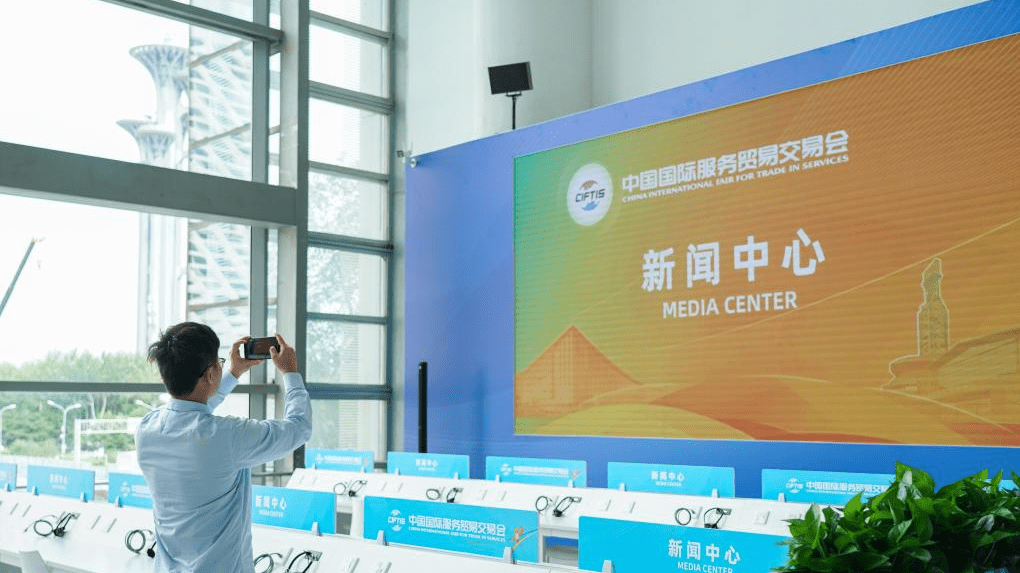
The 2024 China International Fair for Trade in Services (CIFTIS), themed “Global Services, Mutual Benefit and Sharing,” will be held in Beijing from September 12 to 16. With “new quality productive forces” as one of the highlights, this year’s event will focus on opening up, innovation and integration, especially showcasing the latest developments in digitalization, intelligence and green development.
The fair not only showcases new achievements in regional cooperation, but also introduces emerging industries such as artificial intelligence (AI), metaverse technologies, and satellite internet through specialized and innovative content. These new quality productive forces are gradually transforming the development landscape of modern services, high-end manufacturing, and modern agriculture, becoming a significant driving force for economic transformation and upgrading.
The concept of new quality productive forces emphasizes the significant improvement of resource allocation efficiency and productive effectiveness through technological innovation, management innovation and their mutual reinforcement.
Proposed at a critical moment when the global economy is facing challenges and transformations, particularly in the context of the rapid development of digital technology, the transition to new quality productive forces has become an inevitable choice for the development of multiple sectors, including services and manufacturing. By leveraging advanced information technology and smart applications, companies can meet market demands more efficiently, improve customer experience and achieve personalized and tailored services.
In the areas of high-end services and manufacturing, the application of new quality productive forces offers numerous opportunities. With advances in AI technology, traditional production and service models are undergoing profound transformations.
Exhibits at CIFTIS will showcase how AI is revolutionizing traditional industries and promoting deep integration between manufacturing and services. For example, in the transportation and logistics sector, the combination of AI and the Internet of Things has enabled intelligent logistics scheduling, ensuring goods are delivered quickly and safely. In this process, services, as an extension of manufacturing, become a crucial link, forming new business value chains.
Furthermore, the introduction of metaverse technologies is also transforming the operating models of traditional industries. Manufacturing companies can leverage VR and AR for product displays, interactive demonstrations, and training.
Through experiences in the metaverse, consumers can more intuitively understand product features, usage methods, and application scenarios in a virtual environment. This immersive experience not only enhances user engagement, but also increases the market competitiveness of products.
For example, by using advanced equipment such as sensors and drones, farmers can monitor soil moisture, weather changes and crop growth conditions in real time, conduct scientific data analysis, and achieve precise fertilization, irrigation and pest control. This digital transformation improves the economic benefits of agricultural production and, to a certain extent, reduces the burden on the environment, promoting sustainable agricultural development.
The recovery of the global economy depends on the growth of merchandise trade and requires improving competitiveness through the diversified development of trade in services. With the continuous improvement of professional skills and services, the innovative development of trade in services becomes particularly important.
These emerging technologies, especially the popularization of satellite internet and 5G technology, make global services trade more efficient and convenient. Through modern information technology, communication and cooperation between countries have become smoother, significantly increasing opportunities for trade exchanges.
Particularly noteworthy is the rise of the green economy, which has driven deeper cooperation among countries in areas such as environmental protection and renewable energy. For example, companies around the world are collaborating on green technology and clean energy, including joint development of technology and sharing of best practices, which will accelerate the global green transition process. This trend brings new vitality to the international economy and will also play a crucial role in the diversified development of trade in services.
The successful organization of CIFTIS 2024 will provide a platform for countries to introduce themselves and build a bridge of communication and cooperation between companies from various sectors at a global level.
Focusing on the theme of new quality productive forces, participating enterprises, institutions and professionals will share technological innovations and application achievements, jointly exploring how to advance the integration of service trade and traditional industries in the new global economic environment. In the future, the deep integration of services, manufacturing and agriculture will provide a new impetus for global economic recovery and sustainable growth.
The emergence of new quality productive forces has profound implications for the integrated development of services, high-end manufacturing and modern agriculture. We look forward to witnessing how new technologies and models will provide continued impetus to this process at CIFTIS, contributing to the vigorous development of global trade in services.
Note: This article is republished from CGTN through a cooperation agreement between both parties for the dissemination of journalistic content. Original link.
Source: https://reporteasia.com/opinion/2024/09/14/ciftis-2024-fuerzas-productivas-calidad/

